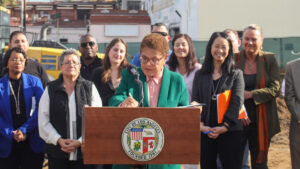No policy issue is more pressing than the rapidly escalating crisis of people experiencing homelessness and our failure to create a comprehensive system to reverse its trajectory.
Committed to advancing solutions to house unsheltered Angelenos, the Committee for Greater LA last year released its We’re Not Giving Up: A Plan for Homelessness Governance in Los Angeles report. To build on the insight garnered in this initial report, the Committee recently commissioned a series of focus groups to gauge Los Angeles voters’ knowledge, attitudes, and perceptions about the issue of homelessness, including existing policies and accountability.
The research, conducted by David Binder Research, consisted of focus groups with voters in Los Angeles County, including white Democratic men, Latinos, Chinese Americans, African Americans, white Democratic, Independent, and Republican women, and millennial voters, to gauge voters’ knowledge, attitudes, and perceptions about the issue of homelessness, including existing policies, and accountability.
“This research shows that Angelenos understand the complicated factors that contribute to the crisis and recognize that there are no easy answers. Any credible solution needs to have clear data, goals, and transparency. Most of all, a plan forward requires clarity of roles and thoughtful coordination between governments, service providers, and the inclusion of those with lived experience,” said Miguel A. Santana, Chair of the Committee for Greater LA and President & CEO of the Weingart Foundation.
The focus group findings show that:
● Voters are frustrated that investments made through the ballot box have not
significantly reduced homelessness.
● Voters trust providers and not-for-profit organizations that are on the ground
responding to the crisis.
● Angelenos are proximate in their daily lives to those experiencing homelessness and
feel compassion for unhoused veterans and people suffering from mental illness and
addiction.
● Angelenos respect the perspective of those who have experienced homelessness and
believes that their struggle provides critical insight on the solutions needed to end the
crisis.
According to the findings, Angelenos don’t see any accountability on how tax dollars are being
spent, no regional plan to evaluate progress, and no consensus on the best practices to deal
with the crisis. Most of all, they do not see anyone in charge. To fill the obvious void of
leadership, Angelenos want an independent entity that tells the truth, offers clear data and
leads in building consensus around a comprehensive and realistic plan. They want a transparent body with measurable, realistic goals that are ambitious enough to generate the momentum needed to move people into treatment and housing.
“We encourage candidates and those in elected office today to advance a more accountable
and coordinated system by reaching a global settlement on pending litigation involving street
homelessness and mental health services, developing one countywide plan to invest the
unprecedented infusion of federal and state dollars to local government,” Santana said.
We hosted two webinars to release the findings. First, on February 9th, the
research was shared with elected officials and candidates urging them to recognize the valid frustration Angelenos has on the issue of homelessness and to be open to the solutions
proposed, rather than considering a unilateral approach. A second webinar for the public was
hosted on Thursday.
Watch the Attitudes on Homelessness in Los Angeles Webinar here:
Are you ready to do more?
The focus group research findings are available for download here.
Read the piece about this work in the Los Angeles Times here
We’re not giving up! Join us by taking the #NoGoingBackLA pledge!



